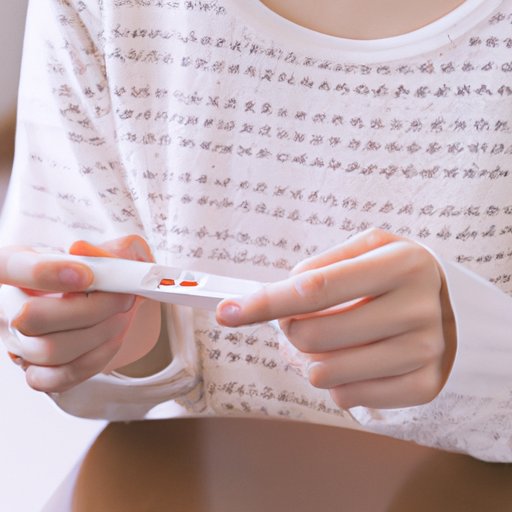Introduction
Implantation is the process in which a fertilized egg attaches itself to the wall of the uterus and begins to grow. Knowing how long after implantation a woman can take a pregnancy test can be crucial in determining whether or not she is pregnant. This article will explore the timing of implantation and when it is best to take a pregnancy test in order to get accurate results.
Exploring the Timing of Implantation and When to Take a Pregnancy Test
There are several factors that can affect the timing of implantation. These include the health of the embryo, the woman’s hormone levels, and the thickness of the uterine lining. Implantation usually occurs 6-12 days after ovulation, but can occur as early as 4 days or as late as 16 days. During implantation, the embryo attaches itself to the uterine wall and begins to develop.
The typical time frame for implantation is 6-12 days after ovulation, so if a woman knows when she ovulated, she can determine when implantation should occur. After implantation has taken place, it takes another few days for the body to produce enough hCG (human chorionic gonadotropin) hormones to be detected on a pregnancy test. For this reason, it is recommended that a woman wait at least 10 days after ovulation before taking a pregnancy test in order to get an accurate result.

A Guide to Understanding Implantation and When to Take a Pregnancy Test
In order to tell if implantation has occurred, a woman should look out for certain signs and symptoms. These include light spotting or bleeding, cramping, and changes in cervical mucus. It is important to note that these signs may also indicate other conditions such as a bladder infection, so it is best to consult with a doctor if any of these symptoms are present.
It is also important to note that home pregnancy tests are not 100% accurate. They can give false positives or negatives depending on the type of test used, the amount of hCG in the urine, and the sensitivity of the test. For this reason, it is best to wait until at least 10 days after ovulation before taking a pregnancy test. If the result is negative but the woman still suspects she might be pregnant, it is recommended that she wait a few more days and then take the test again.

Comparing Implantation Timing in Different Women and Their Pregnancy Test Results
Implantation timing can vary from woman to woman. Some women may experience implantation as early as 4 days after ovulation, while others may experience it as late as 16 days after ovulation. As mentioned earlier, it typically takes a few days for the body to produce enough hCG hormones for a positive result on a pregnancy test, so a woman should wait at least 10 days after ovulation before taking a test.
For example, one woman may experience implantation 8 days after ovulation and take a pregnancy test 12 days after ovulation, resulting in a positive result. Another woman may experience implantation 14 days after ovulation and take a pregnancy test 18 days after ovulation, resulting in a negative result. In both cases, the women waited the recommended 10 days after ovulation before taking the pregnancy test, but the results were different due to the timing of their implantation.
Conclusion
In summary, knowing how long after implantation a woman can take a pregnancy test can be helpful in determining whether or not she is pregnant. Implantation typically occurs 6-12 days after ovulation, and it takes a few days for the body to produce enough hCG hormones for a positive result on a pregnancy test. Therefore, it is recommended that a woman wait at least 10 days after ovulation before taking a pregnancy test. By understanding the timing of implantation and when to take a pregnancy test, a woman can get an accurate result and take the necessary steps to ensure a healthy pregnancy.
(Note: Is this article not meeting your expectations? Do you have knowledge or insights to share? Unlock new opportunities and expand your reach by joining our authors team. Click Registration to join us and share your expertise with our readers.)
